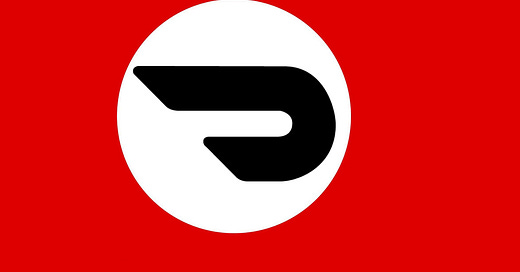Heil Treatler
Treatler or its derivative Treaterlite is a term that started circulating online in late 2024. A rather crude portmanteau of “treat” and “hitler”, the term is used a pejorative for those who are overly reliant on Food Delivery apps like Doordash and UberEats. Despite the obvious pitfalls of deeming someone you disagree with online ‘Hitler’, the term seems to have some semantic utility. Use of food-delivery apps has increased steadily since the pandemic, especially in the U.S. What has seemingly increased in equal measure, is Twitter/X posts in which posters publicly drag Doordash Drivers and Instacart shoppers for seemingly poor service. These complaints range from understandable frustrations of drivers refusing to come to the door, to more concerning critiques, with one woman expressing her dismay that a man of color delivered her food when she was expecting a white woman. Everyone is occasionally frustrated by poor customer service, but there is something needlessly cruel about publicizing your interaction with a poorly paid service worker, with the hopes of said worker being ripped to shreds in the replies. This trend of complaints is emblematic of Americans treating delivery apps like a public service, and not a luxury.
The rise of delivery apps has altered the social fabric of American life, transforming a trip to the grocery store or the local burger joint into a commodity. But behind every commodity there is labor, often performed by someone who is badly treated and poorly compensated. Companies like Uber and Doordash underpay their workers and deny them benefits as a core part of their business model. Running an international taxi service which employs tens of thousands of workers is expensive, and in order to make a profit (which they often don’t), these companies pay their workers the bare minimum. Many so-dubbed ‘treatlers’ express concerns about personal safety, often showing preferences for female drivers and expressing their displeasure when their driver happens to male. Given the minimal background checks that these companies perform, safety concerns are somewhat reasonable. However, in the absence of any serious incident, there is a certain callousness in expecting the person driving your Burger-Taxi to conform to your idealized standards. Most delivery drivers are barely scraping by, and they frankly don’t owe you anything beyond acceptable service. As I write this, Amazon drivers and Starbucks workers are working through the raging Los Angeles wildfires, sacrificing their own safety to deliver customers their little treats. Working in food service is shitty on essentially every level, not mentioning that restaurants lose money through every order that is made on a delivery app.
Many discussions about the ethics of relying on Doordash often culminate in a discussion of the necessity of delivery apps for disabled people, who cannot prepare food or go shopping by themselves. If Doordash was a public service that delivered food to those in need, then I would be in full support. But it isn’t. Doordash is a for-profit business that relies on criminally underpaid workers, to deliver an exorbitantly expensive product. Even if you are reliant on delivery apps to whatever extent, you should still treat service workers with basic dignity and not like personal butlers who shalt receive one hundred Twitter lashings for poor service. The appetite of the American consumer knows little bounds, and sadly, is capable of immense cruelty.


